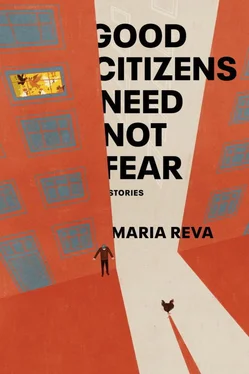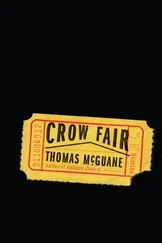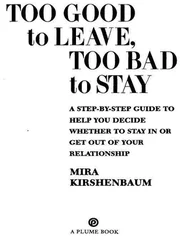Maria Reva - Good Citizens Need Not Fear - Stories
Здесь есть возможность читать онлайн «Maria Reva - Good Citizens Need Not Fear - Stories» весь текст электронной книги совершенно бесплатно (целиком полную версию без сокращений). В некоторых случаях можно слушать аудио, скачать через торрент в формате fb2 и присутствует краткое содержание. Город: New York, Год выпуска: 2020, ISBN: 2020, Издательство: Doubleday, Жанр: Современная проза, humor_satire, на английском языке. Описание произведения, (предисловие) а так же отзывы посетителей доступны на портале библиотеки ЛибКат.
- Название:Good Citizens Need Not Fear: Stories
- Автор:
- Издательство:Doubleday
- Жанр:
- Год:2020
- Город:New York
- ISBN:978-0-38554-529-7
- Рейтинг книги:3 / 5. Голосов: 1
-
Избранное:Добавить в избранное
- Отзывы:
-
Ваша оценка:
- 60
- 1
- 2
- 3
- 4
- 5
Good Citizens Need Not Fear: Stories: краткое содержание, описание и аннотация
Предлагаем к чтению аннотацию, описание, краткое содержание или предисловие (зависит от того, что написал сам автор книги «Good Citizens Need Not Fear: Stories»). Если вы не нашли необходимую информацию о книге — напишите в комментариях, мы постараемся отыскать её.
Good Citizens Need Not Fear: Stories — читать онлайн бесплатно полную книгу (весь текст) целиком
Ниже представлен текст книги, разбитый по страницам. Система сохранения места последней прочитанной страницы, позволяет с удобством читать онлайн бесплатно книгу «Good Citizens Need Not Fear: Stories», без необходимости каждый раз заново искать на чём Вы остановились. Поставьте закладку, и сможете в любой момент перейти на страницу, на которой закончили чтение.
Интервал:
Закладка:
Smena dropped her smile, remembering. “Eggs? Bread?”
Dasha tilted her head, confused. “No thank you.” She turned on her heel and skipped down the corridor, purple dress rustling.
Smena spent the next hour scouring her kitchen, making a mental inventory of the remaining food: three potatoes, two bread heels, nine walnuts, one thimble-size jar of horseradish. Her millet and rice stocks had run out the month prior. If she cut down her already meager consumption, she estimated the supplies would last less than a week.
The smell of boiling chicken now wafting from the heating vent did not help calm Smena’s nerves.
One thing Smena would not do was call her own daughter. After the grandchildren started coming, occasionally the daughter called to suggest Smena come live with her and her family in Crimea. They could sleep on the sofa bed together like old times, her daughter would joke, figure out a cot for the son-in-law. Smena would hear the shrieks of the grandchildren at the other end of the line and try to imagine herself as the babushka depicted in children’s folktales: stout, puffy-cheeked, bending over a cauldron of bubbling pea soup with a wooden spoon in hand, ready to feed, bathe, rear an entire village.
“The time isn’t right for a move,” she had told her daughter the last time they spoke. “I’m too busy.”
“Busy with what?” Her daughter didn’t know about the bone business. “You’re all alone over there!”
Smena took this to mean, “You’re going to die alone over there,” which was where the conversation always headed, and promptly hung up.
Smena’s mother had birthed six other children before she had Smena, and had made a point of telling her that a husband and children were the best insurance against dying alone. The family had lived in a crumbling clay house. One day, when Smena’s father was at work and she and her siblings were at school, Smena’s mother took her metal shears and slashed away at the tall grass outside the window. The blades crunched into an electric cable. Smena was the one who found her mother’s body in the weeds. Smena remembered how her own throat had contracted in shock, how her scream had come out as a hiccup. For a long time Smena had studied her mother’s face, which was set in a wild openmouthed grin, as if she were biting into the sweetest happiness on Earth. Seven children, eighteen years of cleaning, chiding, spanking, loving, pea soup making, and what did it matter? Smena’s mother had died alone, and seemed to have fared all right. Before the accident, Smena had imagined death as a send-off, a majestic ship to board while your party of relatives crowds at the port ledge, waving goodbye. The higher the attendance, the more valued your life. Now, she imagined something more private. Once you got past the ugly physicality of death, you were left with a single boat, a cushion. Room to stretch out the legs.
The second time Nika knocked on the door, she returned the cloves in their newspaper pouch. From the doorway she beamed up at Smena, as though she had proven herself by fulfilling her ridiculous promise. She produced a baking tray of buns from her cloth sack. Fragrant, buttery, they bulged out of the tray in a tight grid, ready to spring into Smena’s mouth. Each had a neat hole on top, from a clove.
“Borrower’s interest,” Nika joked. Her speech had slowed since the last visit, her syllables become more labored.
Smena didn’t know whether it was the hunger, or the shock at this small act of kindness—albeit suspect kindness—that made her say, “Come in for some tea?” before she could stop herself.
“Oh no, thank you. I couldn’t.” But already Nika was kicking off her clogs. “Just for a minute.” She was wearing the same faded socks, with her toe sticking out. Smena offered a pair of furry dalmatian-print slippers, ones Milena usually wore during their meetings.
As Smena brewed tea, Nika separated the buns and arranged them in a circle on a glass platter—also conjured from the magical sack. “Got any butter?” She was quick, antlike, and before Smena could intervene, she opened the refrigerator. The expanse of white gaped at her, empty. With horror Smena imagined this detail registering in the neatly categorized inventory of Nika’s mind, and wanted to snatch it back out.
Without comment Nika turned and marched out of the apartment, leaving Smena to wonder if the state of the refrigerator had offended her. But a few minutes later Nika returned bearing not only butter, but also bread, eggs, and a pat of lard wrapped in a plastic bag, for frying. She began piling the supplies into the refrigerator.
“You don’t have to do that,” said Smena. “I was going to go to the Gastronom tomorrow.”
“So was I. We’ll go together?”
Smena pretended to consider it. “Actually, tomorrow’s no good.”
“The day after.”
“I’m tied up.”
Nika shut the refrigerator, gave its handle a conciliatory stroke. “The benchers told me they haven’t seen you leave the building in months,” she said softly. “They only see your visitors, not you.”
Blasted benchers, Smena thought. Nothing better to do. “Most of those old stumps are half-blind,” she said. “And I move very fast.” She pulled a bill from a metal tin on the counter, knowing she risked insulting the woman. But Nika only laughed, swatted the money away. “Please,” she said. “Kak auknetsja, tak i otkliknetsja.” Do as you would be done by.
The women sat down together. Smena’s discomfort melted away when she took her first bite of bun. Its thin caramelized crust, where egg whites had been painted on in crisscross, protected a warm flaky interior. The best bun she had ever tasted.
Nika ran her hand along the chrome length of the table. “This is nice. Quiet. Where I live it’s a zoo. Fourteen people, another one in my daughter-in-law’s belly. Imagine! Despite his position, my son and his family still haven’t been assigned their own peace.”
Smena wondered if she meant “place,” and if the tumor was pressing a fibrous finger on just the wrong spot. “Which factory does he work for?”
“Timko works for the government.” She let the last word fall heavily, significant.
Perhaps this was a threat? Working for the government meant anything from licking envelopes to spying on high-profile citizens.
“A nice two-room, is that so much to ask?”
Smena wasn’t sure to whom, exactly, the woman was directing the question. But there it was: the dying woman’s motive. A lovely two-room for her lovely family. Her legacy secured. If Smena were to be imprisoned for the bone business, Nika’s growing, government-affiliated family would be next in line for her apartment. Smena wanted to jump up, scream “Gotcha!” like she’d seen a man do at the bazaar once, after he’d stabbed his finger into a vendor’s pot of golden honey to reveal the cheap sugar syrup underneath.
Before Nika left, she placed a second sheet of black film on the table, without inquiring about the first.
An hour later, the new scan glowed on the kitchen window. Smena wanted to track the progression—again, for curiosity’s sake.
The sun’s rays showed more thinning of the bone as the tumor burrowed toward the spinal column. Smena couldn’t help being impressed by the thing—an organism living by its own will, clawing for space in the tight dome of the skull.
The next meeting, Larissa forgot about the bread and eggs, but did bring two albums by John Coltrane.
“Never heard of him,” said Milena, who stood at the window, left thigh resting on the sill.
Larissa straightened the velvet lapels of her blazer and looked up at Milena. “John Coltrane,” she explained, “was one of the most prominent jazz musicians of the twentieth century.” Her nose and cheeks were red and puffy. Despite her best efforts to appear composed, she looked in danger of crumpling to the floor any moment.
Читать дальшеИнтервал:
Закладка:
Похожие книги на «Good Citizens Need Not Fear: Stories»
Представляем Вашему вниманию похожие книги на «Good Citizens Need Not Fear: Stories» списком для выбора. Мы отобрали схожую по названию и смыслу литературу в надежде предоставить читателям больше вариантов отыскать новые, интересные, ещё непрочитанные произведения.
Обсуждение, отзывы о книге «Good Citizens Need Not Fear: Stories» и просто собственные мнения читателей. Оставьте ваши комментарии, напишите, что Вы думаете о произведении, его смысле или главных героях. Укажите что конкретно понравилось, а что нет, и почему Вы так считаете.












